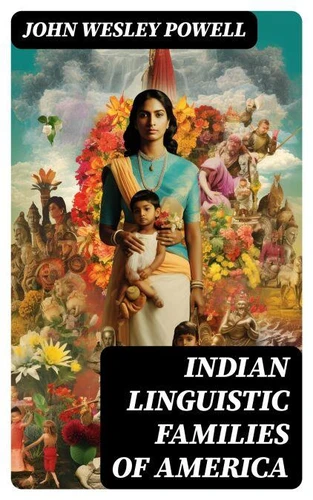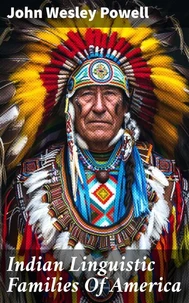Indian Linguistic Families Of America
Par :Formats :
Disponible dans votre compte client Decitre ou Furet du Nord dès validation de votre commande. Le format ePub est :
- Compatible avec une lecture sur My Vivlio (smartphone, tablette, ordinateur)
- Compatible avec une lecture sur liseuses Vivlio
- Pour les liseuses autres que Vivlio, vous devez utiliser le logiciel Adobe Digital Edition. Non compatible avec la lecture sur les liseuses Kindle, Remarkable et Sony
 , qui est-ce ?
, qui est-ce ?Notre partenaire de plateforme de lecture numérique où vous retrouverez l'ensemble de vos ebooks gratuitement
Pour en savoir plus sur nos ebooks, consultez notre aide en ligne ici
- Nombre de pages223
- FormatePub
- ISBN859-65--4775334-6
- EAN8596547753346
- Date de parution14/12/2023
- Protection num.Digital Watermarking
- Taille1023 Ko
- Infos supplémentairesepub
- ÉditeurDIGICAT
Résumé
In "Indian Linguistic Families of America, " John Wesley Powell presents a groundbreaking exploration of the diverse linguistic landscapes of Native American languages. This work, published in 1891, epitomizes Powell's meticulous empirical approach, as he categorizes languages into families based on grammatical, phonetic, and lexical similarities. His study not only contributes to linguistic anthropology but also sets the foundation for future research in American linguistics, illustrating the complex relationship between language and culture within indigenous communities.
Powell's clarity of expression and systematic methodology reflect the intellectual rigor characteristic of the late 19th-century scientific discourse, making it a seminal text in both linguistic and ethnographic studies. John Wesley Powell was a prominent American geologist, explorer, and anthropologist whose adventurous spirit led him to explore the uncharted regions of the American West. His experiences during the Civil War and subsequent expeditions along the Colorado River forged a deep respect for the Native American tribes he encountered.
This respect is evident in his comprehensive documentation and representation of their languages, reflecting Powell's belief in the intrinsic value of all cultures and the importance of preserving their legacies. Readers interested in linguistics, anthropology, or American history will find "Indian Linguistic Families of America" to be an indispensable resource. Powell's keen insights and thorough analysis invite us to appreciate the rich tapestry of indigenous languages, encouraging a deeper understanding of the cultural identities they represent.
This work remains a vital scholarly contribution for those seeking to engage with the intricate dynamics of language and identity.
Powell's clarity of expression and systematic methodology reflect the intellectual rigor characteristic of the late 19th-century scientific discourse, making it a seminal text in both linguistic and ethnographic studies. John Wesley Powell was a prominent American geologist, explorer, and anthropologist whose adventurous spirit led him to explore the uncharted regions of the American West. His experiences during the Civil War and subsequent expeditions along the Colorado River forged a deep respect for the Native American tribes he encountered.
This respect is evident in his comprehensive documentation and representation of their languages, reflecting Powell's belief in the intrinsic value of all cultures and the importance of preserving their legacies. Readers interested in linguistics, anthropology, or American history will find "Indian Linguistic Families of America" to be an indispensable resource. Powell's keen insights and thorough analysis invite us to appreciate the rich tapestry of indigenous languages, encouraging a deeper understanding of the cultural identities they represent.
This work remains a vital scholarly contribution for those seeking to engage with the intricate dynamics of language and identity.
In "Indian Linguistic Families of America, " John Wesley Powell presents a groundbreaking exploration of the diverse linguistic landscapes of Native American languages. This work, published in 1891, epitomizes Powell's meticulous empirical approach, as he categorizes languages into families based on grammatical, phonetic, and lexical similarities. His study not only contributes to linguistic anthropology but also sets the foundation for future research in American linguistics, illustrating the complex relationship between language and culture within indigenous communities.
Powell's clarity of expression and systematic methodology reflect the intellectual rigor characteristic of the late 19th-century scientific discourse, making it a seminal text in both linguistic and ethnographic studies. John Wesley Powell was a prominent American geologist, explorer, and anthropologist whose adventurous spirit led him to explore the uncharted regions of the American West. His experiences during the Civil War and subsequent expeditions along the Colorado River forged a deep respect for the Native American tribes he encountered.
This respect is evident in his comprehensive documentation and representation of their languages, reflecting Powell's belief in the intrinsic value of all cultures and the importance of preserving their legacies. Readers interested in linguistics, anthropology, or American history will find "Indian Linguistic Families of America" to be an indispensable resource. Powell's keen insights and thorough analysis invite us to appreciate the rich tapestry of indigenous languages, encouraging a deeper understanding of the cultural identities they represent.
This work remains a vital scholarly contribution for those seeking to engage with the intricate dynamics of language and identity.
Powell's clarity of expression and systematic methodology reflect the intellectual rigor characteristic of the late 19th-century scientific discourse, making it a seminal text in both linguistic and ethnographic studies. John Wesley Powell was a prominent American geologist, explorer, and anthropologist whose adventurous spirit led him to explore the uncharted regions of the American West. His experiences during the Civil War and subsequent expeditions along the Colorado River forged a deep respect for the Native American tribes he encountered.
This respect is evident in his comprehensive documentation and representation of their languages, reflecting Powell's belief in the intrinsic value of all cultures and the importance of preserving their legacies. Readers interested in linguistics, anthropology, or American history will find "Indian Linguistic Families of America" to be an indispensable resource. Powell's keen insights and thorough analysis invite us to appreciate the rich tapestry of indigenous languages, encouraging a deeper understanding of the cultural identities they represent.
This work remains a vital scholarly contribution for those seeking to engage with the intricate dynamics of language and identity.






